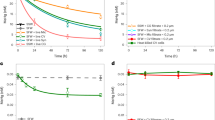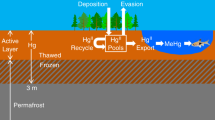Abstract
METHYLMERCURY can accumulate in fish to concentrations that threaten human health1. Fish methylmercury concentrations are high in many reservoirs2 and acidic lakes3, and also in many remote lakes4,5—a fact that may be related to increased atmospheric deposition of anthropogenically mobilized mercury during the past few decades6. Although sources of methylmercury to lakes and reservoirs are known7, in-lake destruction has not been demonstrated to occur at the low concentrations found in most water bodies. Here we report in situ incubations of lake water that show that methylmercury is decomposed by photo- degradation in surface waters. This process is abiotic and the rate is first-order with respect to methylmercury concentration and the intensity of solar radiation. In our study lake, the calculated annual rates of methylmercury photodegradation are almost double the estimated external inputs of methylmercury from rain, snow, streamflow and land runoff, implying the existence of a large source of methylmercury from bottom sediments. Photodegradation could also be an important process in the mercury cycle of other aquatic systems. This discovery fundamentally changes our understanding of aquatic mercury cycling, and challenges the long-accepted view that microbial demethylation dominates methylmercury degradation in natural fresh waters.
This is a preview of subscription content, access via your institution
Access options
Subscribe to this journal
Receive 51 print issues and online access
$199.00 per year
only $3.90 per issue
Buy this article
- Purchase on Springer Link
- Instant access to full article PDF
Prices may be subject to local taxes which are calculated during checkout
Similar content being viewed by others
References
Clarkson, T. W. in Mercury Pollution: Integration and Synthesis, (eds Watras, C. J. & Huckabee, J. W.) 631–641 (Lewis, Chelsea, Ml, 1994).
Hecky, R. E., Ramsay, D. J., Bodaly, R. A. & Strange, N. E. in Advances in Mercury Toxixology, (eds Suzuki, T., Imura, A. & Clarkson, T. W. F.) 33–52 (Plenum, New York, 1991).
Weiner, J. G. Trans. N.A. Wild. & Nat. Res. Conf. 52, 645–657 (1989).
Bodaly, R. A., Rudd, J. W. M., Fudge, R. J. P. & Kelly, C. A. Can. J. Fish. aquat. Sci. 50, 980–987 (1993).
Haines, T. A., Komov, V. T. & Jagoe, C. H. in Mercury Pollution: Integration add Synthesis, (eds Watras, C. J. & Huckabee, J. W.) 397–407 (Lewis, Chelsea, MI, 1994).
Swain, E. B., Engstrom, D. R., Brigham, M. E., Henning, T. A. & Brezonik, P. L. Science 257, 784–787 (1992).
Rudd, J. W. M. Wat. Air Soil Pollut. 80, 697–713 (1995).
Horvat, M., Liang, L. & Bloom, N. S. Analyt. chim. Acta 282, 153–168 (1993).
Amyot, M., Mierle, G., Lean, D. R. S. & McQueen, D. J. Envir. Sci. Technol. 28, 2366–2371 (1994).
Hudson, R. J. M., Gherini, S. A., Watras, C. J. & Porcella, D. B. in Mercury Pollution: Intergration and Synthesis, (eds Watras, C. J. Huckabee, J. W.) 473–523 (Lewis, Chelsea, MI, 1994).
Inoko, M. Envir. Pollut. B 2, 3–10 (1981).
Zepp, R. G., Baughman, G. L., Wolfe, N. L. & Cline, D. M. Envir. Lett. 6, 117–127 (1974).
Xiao, Z. F., Munthe, J., Stromberg, D. & Lindqvist, O. in Mercury Pollution: Intergration and Synthesis (eds Watras, C. J. & Huckabee, J. W.) 581–592 (Lewis, Cheksea, Ml, 1994).
Vandal, G. M., Mason, R. P. & Fitzgerald, W. F. Wat. Air Soil Pollut. 56, 791–803 (1991).
Xun, L-Y., Campbell, N. E. R. & Rudd, J. W. M. Can. Fish aquat. Sci. 44, 750–757 (1987).
Ramal, P. S., Rudd, J. W. M. & Hecky, R. E. Appl. Envir. Microbiol. 51, 110–114 (1986).
Winfrey, M.R & Rudd, J.W.M. Envir. Toxicol. Chem. 9, 853–869 (1990).
Fee, E. J. Can Tech. Rep. Fish. aquatic. Sci. 1740, (1990).
Shearer, J. A., DeBryun, E. R., DeClerq, D. R., Schindler, D. W. & Fee, E. J. Can. Tech. Rep. Fish. Aquat. Sci. 1341, (1985).
St. Louis, V. L. et al. Can. J. Fish. aquat. Sci. 51, 1065–1076 (1994).
Gilmour, C. G., Henry, E. A. & Mitchell, R. Envir. Sci. Technol. 26, 2281–2287 (1992).
Hultberg, H., Iverfeldt, A. & Lee, L. H. in Mercury Pollution: Integration and Synthesis, (eds Watras, C. J. & Huckabee, J. W.) 313–322 (Lewis, Chelsea, MI 1994).
Watras, C. J. et al., in Mercury Pollution: Integration and Synthesis (eds Watras, C. J. & Huckabee, J. W.) 153–177 (Lewis, Chelsea, MI, 1994).
Henry, E. A., Dodge-Murphy, L. J., Bigham, G. N., Klein, S. M. & Gilmour, C. C. Wat. Air Soil Pollut. 80, 509–518 (1995).
Author information
Authors and Affiliations
Rights and permissions
About this article
Cite this article
Seller, P., Kelly, C., Rudd, J. et al. Photodegradation of methylmercury in lakes. Nature 380, 694–697 (1996). https://doi.org/10.1038/380694a0
Received:
Accepted:
Issue Date:
DOI: https://doi.org/10.1038/380694a0
This article is cited by
-
A hidden demethylation pathway removes mercury from rice plants and mitigates mercury flux to food chains
Nature Food (2024)
-
A 1500-year record of mercury isotopes in seal feces documents sea ice changes in the Antarctic
Communications Earth & Environment (2023)
-
Arctic Ocean’s wintertime mercury concentrations limited by seasonal loss on the shelf
Nature Geoscience (2022)
-
Watershed influences on mercury in tributaries to Lake Ontario
Ecotoxicology (2020)
-
The effects of climate, habitat, and trophic position on methylmercury bioavailability for breeding New York songbirds
Ecotoxicology (2020)
Comments
By submitting a comment you agree to abide by our Terms and Community Guidelines. If you find something abusive or that does not comply with our terms or guidelines please flag it as inappropriate.



